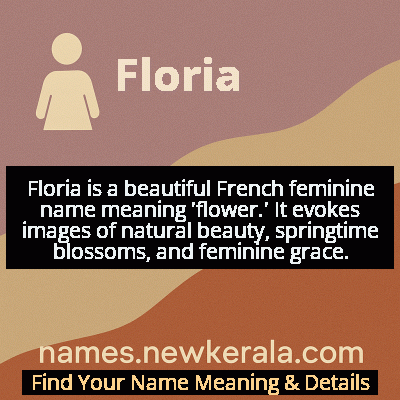Floria Name Meaning & Details
Origin, Popularity, Numerology Analysis & Name Meaning of Floria
Discover the origin, meaning, and cultural significance of the name FLORIA. Delve into its historical roots and explore the lasting impact it has had on communities and traditions.
Name
Floria
Gender
Female
Origin
French
Lucky Number
7
Meaning of the Name - Floria
Floria is a beautiful French feminine name meaning 'flower.' It evokes images of natural beauty, springtime blossoms, and feminine grace.
Floria - Complete Numerology Analysis
Your Numerology Number
Based on Pythagorean Numerology System
Ruling Planet
Neptune (Ketu)
Positive Nature
Intuitive, analytical, spiritual, and inquisitive.
Negative Traits
Secretive, reserved, aloof, and can be overly critical.
Lucky Colours
Green, yellow.
Lucky Days
Monday.
Lucky Stones
Cat’s eye, moonstone.
Harmony Numbers
1, 5, 6.
Best Suited Professions
Scientists, researchers, spiritual leaders, detectives.
What People Like About You
Depth of knowledge, analytical skills, spirituality.
Famous People Named Floria
Floria Tosca
Opera character
Protagonist in Puccini's famous opera 'Tosca', a passionate singer caught in political intrigue
Floria Sigismondi
Film director and photographer
Renowned for directing music videos for David Bowie, Marilyn Manson, and The White Stripes, known for her Gothic aesthetic
Floria Lasky
Entertainment lawyer
Represented major Broadway figures including Tennessee Williams and Stephen Sondheim, pioneering female attorney in entertainment law
Floria Grassi
Italian noblewoman
Patron of arts and letters in 15th century Milan, known for her intellectual salons and support of humanist scholars
Name Variations & International Equivalents
Click on blue names to explore their detailed meanings. Gray names with will be available soon.
Cultural & Historical Significance
Throughout European history, Floria has been associated with spring festivals and May Day celebrations, where flowers symbolize new beginnings and fertility. In French aristocratic tradition, the name was sometimes given to daughters born in spring or to families with connections to gardening or botanical interests. The name's enduring appeal across centuries speaks to the universal human connection to nature's beauty and the symbolic power of flowers in representing life's most precious qualities.
Extended Personality Analysis
Women named Floria are often perceived as graceful, nurturing individuals with a deep appreciation for beauty in all its forms. They typically exhibit artistic sensibilities, emotional depth, and a gentle strength that draws others to them. Florias are frequently described as having a calming presence and natural elegance, combined with resilience that allows them to weather life's challenges while maintaining their inherent grace. Their connection to the floral meaning often manifests in creative expression, whether through art, music, or gardening.
In interpersonal relationships, Florias tend to be intuitive and empathetic, making excellent listeners and loyal friends who bring beauty and harmony to their environments. They often possess a quiet determination and inner strength that may surprise those who initially perceive them as delicate. The floral association suggests someone who grows and adapts to their circumstances while maintaining their core identity, much like flowers that bend with the wind but don't break. This combination of gentle exterior with resilient interior makes Florias particularly effective in caring professions, artistic pursuits, or any field requiring both sensitivity and perseverance.
Modern Usage & Popularity
Floria remains an elegant, somewhat uncommon choice in modern times, particularly favored by parents seeking a name with classical roots and natural beauty. While not among the most popular names, it has maintained steady usage in French-speaking regions and among those appreciating its romantic, floral connotations. The name has seen a slight resurgence in recent years as vintage names return to fashion, though it remains distinctive enough to stand out. Contemporary usage often reflects a preference for names that are both feminine and strong, with natural elements appealing to modern sensibilities about environmental awareness and organic living. The name's rarity adds to its appeal for parents wanting something unique yet established, with international recognition and easy pronunciation across multiple languages.
Symbolic & Spiritual Meanings
Symbolically, Floria represents the cycle of life, growth, and renewal inherent in the natural world. The name embodies the metaphorical journey from bud to full bloom, suggesting personal development, unfolding potential, and the beauty of transformation. In various cultural contexts, it symbolizes purity, innocence, and the delicate yet resilient nature of feminine strength. The floral connection also carries meanings of fertility, abundance, and the celebration of life's fleeting beauty. As a symbolic representation, Floria suggests someone who brings color and vitality to their surroundings while maintaining the quiet strength of rootedness and natural grace. The name serves as a reminder of nature's cycles and the importance of blooming where one is planted, adapting to circumstances while maintaining one's essential beauty and purpose.

